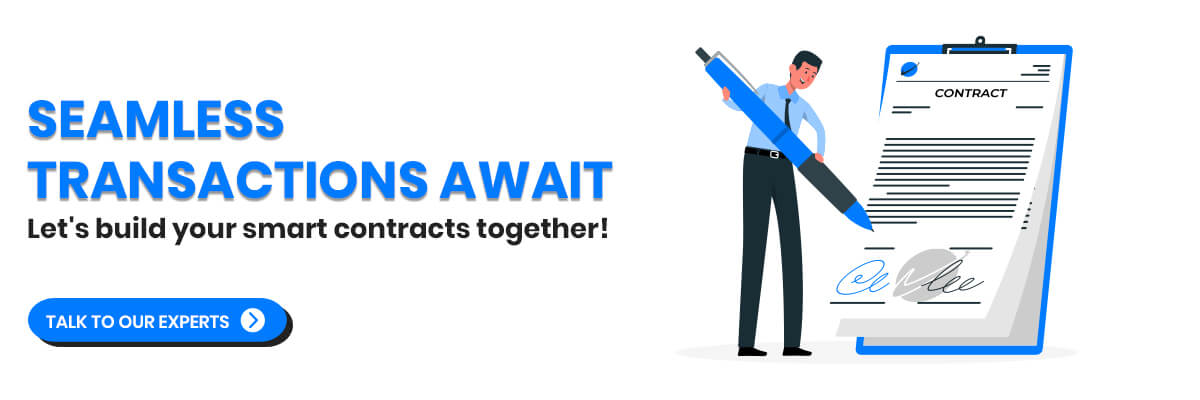Smart contracts refer to self-executing source codes that allow the necessary contractual or other activities to be completed automatically. The transactions are irrevocable and traceable once they are finished. The easiest way to visualize a smart contract is to compare it to a vending machine. The machine dispenses the item of your choice when you input the proper amount of money and press the button. This is done by a program called smart contracts blockchain.
Smart contracts replace the central authority, court, or additional enforcement mechanism since the model enables better trustworthy transactions and agreements between a large number of participants who do not necessarily know each other because they are strangers. Although the technology is still associated with Bitcoin’s technical foundation, it goes well beyond that.
Why Are Smart Contracts Useful?
These self-executing contracts eliminate middlemen and provide independence in everything from straightforward transactions to intricate undertakings. In every given sector or situation, intermediaries always demand a cut. You don’t have to pay or rely on intermediaries when using an automated smart contract since they are unnecessary. This simplifies things and may lower the cost of smart contracts.
In essence, the entire system lacks confidence. You don’t need to rely on brokers or attorneys to carry out or enforce the transaction. Thus, smart contracts blockchain operates quickly and without interruption. Smart contracts run on blockchain technology, which produces unchangeable data that cannot be altered. A layer of security is added to the transaction when the data is encrypted.
A growing number of sectors are realizing how flexible smart contract technology is. The possibilities are endless when it comes to real-world instances, especially when it comes to financial services and property ownership. A public ledger powers smart contracts. Transparency is created since all users on the network can see the transactions. Additionally, transactions on a distributed ledger cannot be altered or removed. Simple transactions may be executed using a smart contract development company, but complex exchanges involving several participants can also be effectively handled by blockchain technology.
Various Uses for Smart Contracts Blockchain in Different Environments
Smart contracts have been adopted and modified by several blockchain networks, customizing them for their own ecosystems. Many different sectors are undergoing a change thanks to smart contracts, which can conduct transactions automatically and record them permanently. They provide real benefits for many different industries since they eliminate the need for middlemen, guarantee transparency, and expedite procedures.
-
Supply Chain Management
In the logistics industry, for instance, smart contracts can track consignments and even make payments each time specific conditions are triggered, such as delivery of the consignment. By eliminating manual handling and verification, this automation cuts down on delays.
All supply chain steps, from production to delivery, are tracked using smart contracts blockchain technology. For delicate things like medications, such as tracing the travel of individual items, this openness aids in confirming the validity of products.
By referring to unchangeable records of transactions and activities, smart contracts can quickly resolve disputes, lowering losses from delays and enabling faster settlement.
-
Smart Contract in Finance
Blockchain technology and smart contract features make decentralized finance (DeFi) dApps an excellent option to replace traditional financial services, and they are gaining traction because of their trustless, immutable, and transparent nature. DeFi dApps enable completely new product categories and decentralized business models that may be very advantageous and useful for customers.
In addition to providing banking and financial services a smart contracts development company offers industry-related services like lending, borrowing, trading, and a plethora of other financial services. dApps have the ability to reduce barriers to entry for individuals worldwide into the financial services industry through the enhanced transparency provided by smart contracts.
-
Digital Identity Cards
To create a digital identity card, users can store digital assets and reputational data on smart contracts. Smart contracts that are connected to several internet platforms allow other external stakeholders to get personal information about individuals without disclosing who they really are.
These contracts, for example, may contain credit ratings that lenders can use to confirm loan applications without running the risk of discriminatory or demographic profiling. Similarly, there is little chance of hiring prejudice based on gender when candidates share resumes.
-
NFTs and Gaming
Non-fungible tokens (NFTs) are a further use-case for smart contracts. Smart contracts are used in these exclusive digital assets to establish ownership, origin, and scarcity. Anything may be represented by an NFT, including video games, music, art, and collectables.
Video games and NFTs are a great combination. To facilitate the ownership, transfer, and monetization of digital goods on gaming platforms, smart contracts blockchain are used. Developers can get royalties for their works, and players can benefit from and own their digital goods.
The immersion and interactivity of the gaming experience may be enhanced via NFTs and smart gaming contracts. A lively and varied community of players and producers may be fostered by NFTs and gaming contracts.
-
Government Voting System
The voting mechanism is less vulnerable to manipulation because of the smart contracts blockchain, which offers a safe environment. Smart contract voting would be ledger-protected, meaning that it would be very challenging to interpret.
Furthermore, because of the cumbersome process that requires voters to line up, verify their identification, and fill out paperwork, smart contracts may lead to a higher voter turnout than usual. A voting system’s participation rate may rise if voting is moved online using smart contracts.
-
Healthcare
The healthcare sector may greatly benefit from the integration and application of blockchain smart contracts in several roles. Smart contracts, for instance, can expedite the management of patient data by providing authorized healthcare practitioners with quick and secure access. Additionally, they can automate the intricate process of medical billing, which lowers mistakes and deters fraud.
Furthermore, it is necessary to note that smart contracts are fundamental for the efficient operation of the pharmaceutical supply chain. They reduce the chances of forging fake drugs in the market and guarantee the genuine nature of the prescribed drugs from the manufacturer to the end user. Notably, clinical trial administration may be completely transformed by a smart contracts development company.
-
Intellectual Assets
In the digital era, intellectual property rights have long been a problem. By providing visible and unchangeable records for the protection of creative works, smart contracts provide an answer for authors, artists, and other creators. These agreements have automated enforcement of royalty payments, license conditions, and copyrights. By doing away with middlemen like copyright attorneys and agencies, a smart contracts development company not only empowers artists but also improves accountability and promotes a more equitable profit distribution.
Conclusion
Smart contracts are transforming blockchain applications by providing automated, safe, and decentralized solutions for several sectors. Their flexibility improves openness and efficiency in a variety of industries, including real estate, healthcare, and supply chains. Web 3.0 India’s smart contracts blockchain holds great potential for revolutionizing the way we engage with and utilize decentralized ecosystems as blockchain technology advances.





